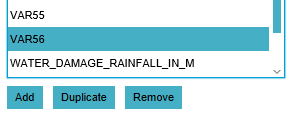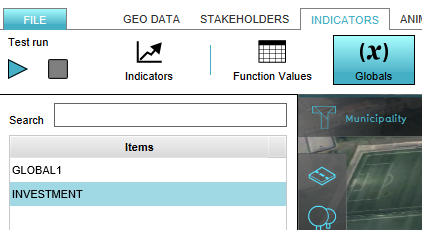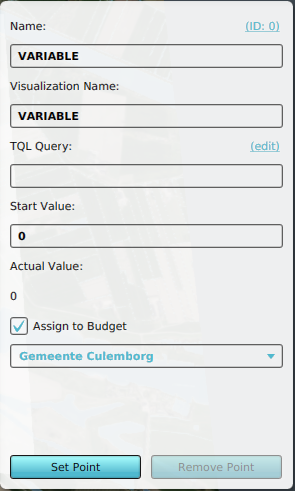Global: Difference between revisions
No edit summary |
No edit summary |
||
| Line 9: | Line 9: | ||
==Properties of globals== | ==Properties of globals== | ||
A global is always made up of a name of the global and a number. Based on the purpose of the global the number | A global is always made up of a name of the global and a number. Based on the purpose of the global the number represents an amount or a value which is specified by the name. | ||
===Output=== | ===Output=== | ||
By using a <code>SELECT_GLOBAL_WHERE_NAME_IS_GLOBALID</code> query you can obtain the value of a global. This global value then can be used in [[Excel|Excel]] calculations. | By using a <code>SELECT_GLOBAL_WHERE_NAME_IS_GLOBALID</code> query you can obtain the value of a global. This global value then can be used in [[Excel|Excel]] calculations. | ||
It is also possible to connect the global to the budget of a specific stakeholder to directly influence the budget during a session. When the given value is a positive number it will increase the budget | It is also possible to connect the global to the budget of a specific stakeholder to directly influence the budget during a session. When the given value is a positive number it will increase the budget. When the given value is a negative number it will decrease the budget. | ||
===Input=== | ===Input=== | ||
The value of a global can be updated by using the <code>UPDATE_GLOBAL</code> statement. This can be used for example to have [[Excel|Excel]] | The value of a global can be updated by using the <code>UPDATE_GLOBAL</code> statement. This can be used for example to have [[Excel|Excel]] calculations change the value of a global. Globals can also be changed by making use of a SET_GLOBAL_VALUE [[Events|Event]]. With a A SET_GLOBAL_VALUE [[Events|Event]] you can influence the budget or the calculation the global is used for. | ||
==Add and remove Globals== | ==Add and remove Globals== | ||
| Line 39: | Line 39: | ||
====Visualization Name==== | ====Visualization Name==== | ||
: ''The Visualization Name is the name that is visible for the user after a global is made visual in the project, instead of the Name that is | : ''The Visualization Name is the name that is visible for the user after a global is made visual in the project, instead of the Name that is used as the global ID. This is the case when for example, a set point in the 3D world is used, when a global is displayed in a panel or when the global is connected to the budget of a stakeholder.'' | ||
====Start Value==== | ====Start Value==== | ||
| Line 48: | Line 48: | ||
====Stakeholder==== | ====Stakeholder==== | ||
: '' | : ''Here you can select the [[Stakeholder|stakeholders']] budget which the global is assigned to.'' | ||
====Remove Point==== | ====Remove Point==== | ||
: ''With the remove point option you can remove the visual global | : ''With the remove point option you can remove the visual global from the 3D world. The global is still present in the project, as you can see in the right panel, only it is not visible anymore in the 3D world.'' | ||
====Set Point==== | ====Set Point==== | ||
: ''With the set point option you can let a global be displayed at a specific point in the 3D world. You can attach the global to a specific place in the 3D world regardless whether there is a construction. More information about how to draw a point in the 3D world is explained on the [[Brush|brush panel page]]'' | : ''With the set point option you can let a global be displayed at a specific point in the 3D world. You can attach the global to a specific place in the 3D world regardless of whether there is a construction. More information about how to draw a point in the 3D world is explained on the [[Brush|brush panel page]]'' | ||
[[File:Global_set_point.png|800px|middel|Stakeholder properties]] | [[File:Global_set_point.png|800px|middel|Stakeholder properties]] | ||
Revision as of 08:40, 3 August 2016
Global
A global is a value that exists in the project but is not necessarily connected to a specific component. The global can be used, for example in Excel calculations and influence the calculation of an Excel indicator. A global is similar to an attribute but for the entire project rather than for a specific component. The name of the global is also the global ID that can be used in queries.
Global Uses
When you have created a global it can be used communicate with a Microsoft Excel spreadsheet, when using such a spreadsheet for a (custom) Excel. Also, globals are currently used to attach to the budget of a stakeholder and hereby directly influence the budget of this specific stakeholder.
Properties of globals
A global is always made up of a name of the global and a number. Based on the purpose of the global the number represents an amount or a value which is specified by the name.
Output
By using a SELECT_GLOBAL_WHERE_NAME_IS_GLOBALID query you can obtain the value of a global. This global value then can be used in Excel calculations.
It is also possible to connect the global to the budget of a specific stakeholder to directly influence the budget during a session. When the given value is a positive number it will increase the budget. When the given value is a negative number it will decrease the budget.
Input
The value of a global can be updated by using the UPDATE_GLOBAL statement. This can be used for example to have Excel calculations change the value of a global. Globals can also be changed by making use of a SET_GLOBAL_VALUE Event. With a A SET_GLOBAL_VALUE Event you can influence the budget or the calculation the global is used for.
Add and remove Globals

- In the ribbon header, select "Indicators".
- In the ribbon bar, select "Globals".
- In the left panel, select "Add".
- In the ribbon header, select "Indicators".
- In the ribbon bar, select "Globals".
- In the left panel, select the global you wish to duplicate.
- In the left panel, select "Duplicate".
- In the ribbon header, select "Indicators".
- In the ribbon bar, select "Globals".
- In the left panel, select the global you wish to remove.
- In the left panel, select "Remove".
How to edit Globals

- Selecting a global in the left panel makes its properties adjustable in the right panel.

Name
- Each global has a name which is shown in the left panel as a list of all globals that are created in the project. The global's Name is the name of the Global ID which is used in queries.
Visualization Name
- The Visualization Name is the name that is visible for the user after a global is made visual in the project, instead of the Name that is used as the global ID. This is the case when for example, a set point in the 3D world is used, when a global is displayed in a panel or when the global is connected to the budget of a stakeholder.
Start Value
- The value of the global at the beginning of the session. In the scenario that the value is representing currency, the given value can be specified either as a positive or a negative number
Assign to Budget
- With this checkbox you can decide whether you want to attach the value to the budget of a certain stakeholder or not. If you check this box the value is automatically counted as currency. In this way, the global can also be used to create debt.
Stakeholder
- Here you can select the stakeholders' budget which the global is assigned to.
Remove Point
- With the remove point option you can remove the visual global from the 3D world. The global is still present in the project, as you can see in the right panel, only it is not visible anymore in the 3D world.
Set Point
- With the set point option you can let a global be displayed at a specific point in the 3D world. You can attach the global to a specific place in the 3D world regardless of whether there is a construction. More information about how to draw a point in the 3D world is explained on the brush panel page
